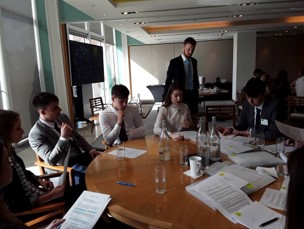The Global Citizenship program aims to enable students to develop the skills and competencies needed to advance the UN Sustainable Development Goals (SDGs), through which students will be better able to:
- Gain understanding and insights on the SDGs and focus on one Goal in which they have a particular interest
- Apply rapid action on their chosen SDG
- Compare and learn to collaborate with diverse networks
- Gain skills in challenging preconceptions and a confidence in how to better inform people’s perspectives
- Understand the nature of hierarchies and compare approaches to best operate across them
- Evaluate their own values and integrity in regard to key global issues.
The course can be embedded into an institution’s existing programmes or classes to earn degree credit.
What do students do in this activity?
2,000 students across the U21 network participate in a 3 week blended learning journey consisting of 12 hours of learning delivered by Common Purpose. They participate in a two week asynchronous course where they develop a better understanding of the SDGs, choose an SDG they want to advance, hear from industry leaders and fellow students on how to effect change, share learnings and reflections with their peers and develop the 21st century skills needed to advance the SDGs.
The course is designed on Kolb’s model for experiential learning. At the end of each of the five modules students complete a graded reflective assessment, each one corresponding to one of the five skill outcomes for the course. In these reflections they draw conclusions based on their own context and existing knowledge, plan on how to implement it in their lives and studies and then take that learning into the next module. They also can participate in weekly real-time reflection workshops held over Zoom where they work with their peers across the world to explore and articulate their learning, skills development and action plans ahead.
At the end of the course content they complete a final graded assessment on their learning and reflections across the whole course and how they will implement them ahead as they advance their SDGs. This final assessment is graded by Peer Review, so each student can further reflect on their own learning through the lens of their peers assessment and reflections.
In addition, throughout the asynchronous course content students can share their reflections based on the videos, articles and content shared, ask them reflection questions to respond to on discussion boards, and share with their peers in subject specific smaller discussion groups. Finally, they have the chance to share their reflections verbally with their peers on the real-time reflection workshops, this can be in plenary with up to 500 of their peers or in breakout rooms with 20 of their peers.
Students who successfully complete the course earn the Common Purpose and U21 Global Citizenship micro-credential.
Preparing students for the reflective component
The course is facilitated by an experienced team of Common Purpose facilitators who hold the learning journey and guide students throughout. They comment on students posts on the discussion boards and pose questions to deepen learning. They also facilitate the real time reflection workshops which are designed to give students the chance to discuss with their peers, unpick their learning, articulate their key reflections and create plans to implement their learning in their lives and studies.
Each graded assessment is carefully and intentionally designed by Instructional Designers at Common Purpose so that it relates directly to the module’s content they have just completed and enables them to clearly and simply articulate their reflections and learning. It has clear instructions, learning outcomes and guidance so that students know what is expected of them for the assessment. The assessments are also designed to speak to different learning and reflection styles.
Linking these reflections to the students’ overall employability development
All students who get a Pass grade for the five assessments and final assessment are issued with the Common Purpose and U21 Global Citizenship micro-credential, demonstrating to future employers they have developed critical 21st century employability skills. The micro-credential has an associated digital badge which students can post on their social media channels such as LinkedIn so that their network and potential employers can see that they’ve developed these 21st century employability skills. Of the 1,193 students who were eligible to apply for the micro-credential, 97% did, clearly demonstrating the employability value and edge students saw it as providing.
Students’ employability is at the core of this course. The five employability skills they develop were co-created with 1,000 young people across the world and an Advisory Group of senior industry leaders chaired by the Partner for Global Talent at EY. They were created as key employability skills for the 21st century and the assessment data at the end of the course, and uptake of the micro-credential, clearly demonstrate the employability edge the course delivered for a very large cohort of students. In addition, this course enabled 2,000 students to have a virtual mobility experience, giving them the global experience, mindset, networks and connections that employers value in today’s world and workplace, which they wouldn’t have been able to have otherwise.
Each student had to commit to one SDG they wanted to advance and use the course thought leadership and skills developed to create plans to further their SDG outside the course. The graded assessments and final assessment create a detailed action plan for them to implement their learning and reflections and step up as global citizens.
Impact of using self-reflection
As evidenced by U21’s recent research, “Exploring the impact of student mobility and extracurricular engagement on academic performance and graduate outcomes” (2020), the employability value of co-curricular and mobility experience lies so heavily in the provision of self-reflection activities and processes. It is absolutely critical that we enable students to extract all the learning, development and employability value from these experiences so that they can go onto be the successful employees and managers we all want them to be in their careers and the citizens and leaders we need them to be out in society.
With 2,000 students accessing the course and any student earning the micro-credential completing six assessments it meant there was a large volume of assessments to be graded. Given the work done designing the assessments and instructions, clear expectations from universities that students complete the course and feedback given if it needed improvement we saw high levels of students passing assessments which lessened the grading load.
For the next iteration of Global Citizenship we will be assessing multiple learning outcomes per assessment so that students complete a total of three separate assessments rather than six assessments. The rigour will remain but the perceived volume of assessments will be reduced



